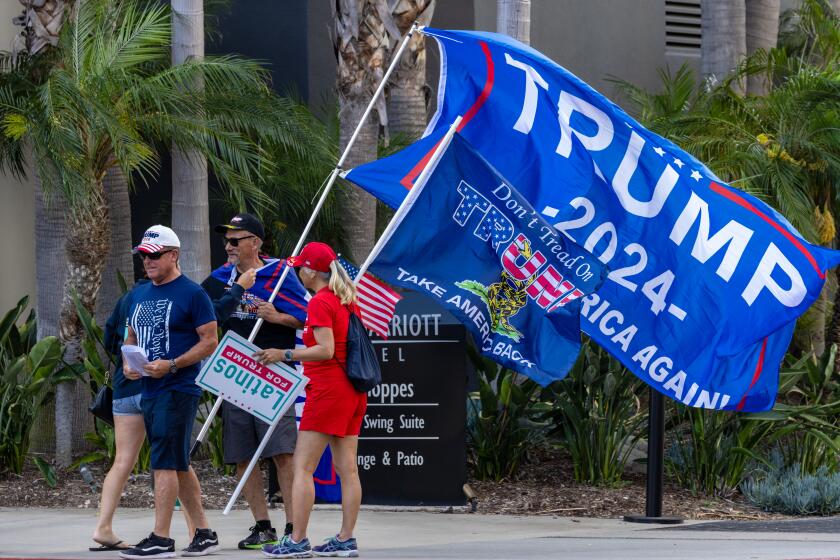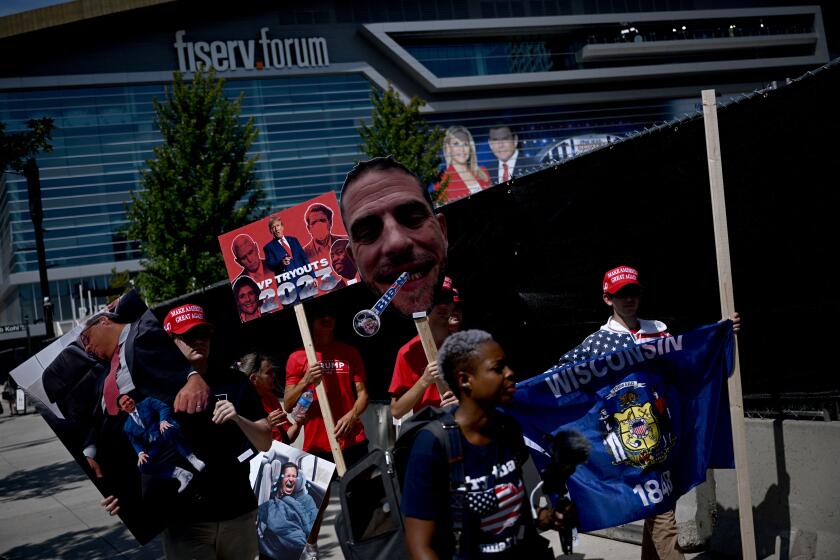Trump is on track to sweep California’s delegates in presidential race, poll shows

- Share via
Former President Trump dominates his rivals so heavily that he’s on track to win all of California’s delegates for next year’s Republican convention — a haul that would give him a major chunk of the votes needed to secure his third presidential nomination.
The finding from a new UC Berkeley Institute of Governmental Studies poll co-sponsored by the Los Angeles Times highlights a turnabout from earlier this year. In February, Trump faced a serious challenge from Florida Gov. Ron DeSantis among California Republicans.
The potential for Trump to win all of the state’s delegates also reflects his campaign’s work to change the rules of the contest to his advantage.
In late July, the California Republican Party changed its rules so that if a candidate wins more than 50% of the statewide vote in the state’s March 5 primary, he or she will claim all 169 GOP delegates — the most of any state in the nation. Previously, the rules allocated delegates by congressional district. A candidate needs just over 1,200 convention delegates to win the nomination.
Trump’s campaign pushed for the rule change, one of a series of such shifts it has backed in states across the nation. All of the changes supported by his campaign have the effect of helping a front-runner quickly nail down the Republican nomination.
New state GOP presidential primary rules for 2024 are likely to help Trump win California delegates and make the state less competitive for other Republicans.
The new poll shows about 55% of likely Republican voters plan to cast their primary ballots for Trump. DeSantis’ support has plummeted to 16% — less than half of what he had earlier this year.
“Californians have turned away, by and large, from DeSantis,” said Mark DiCamillo, director of the UC Berkeley institute’s poll. “The biggest beneficiary of DeSantis’ decline is the former president. There’s no question he’s well-liked by the Republican base.”
“It’s a startling development given the fact that over the past year, there appeared to be sentiment among Republicans looking for an alternative to Trump,” DiCamillo added. “That has changed, and Trump is now the odds-on favorite.”
“Capturing all of California’s delegates would give Trump a huge advantage over the rest of the field,” he noted.
The state party’s rule changes were one factor in the recent decision by a super PAC backing DeSantis to stop major campaign operations in California and several other states, NBC News reported last week.

On the Democratic side, the poll indicated President Biden holds a big lead ahead of California’s primary, with 66% of party voters supporting him, compared with 9% for Robert F. Kennedy Jr. and 3% for Marianne Williamson. About 1 in 6 likely Democratic voters said they were undecided.
Biden gets less support from young, Latino and Asian American voters than from white and Black voters. That difference in enthusiasm is unlikely to hurt his chances in California, given his wide lead, but it reflects a problem for the president that could be serious elsewhere in the nation.
Biden also holds a big lead over Trump in a prospective general election matchup in the state, not surprising given California’s cobalt-blue tilt.
Of the state’s 22 million registered voters, 46.9% identify as Democrats, 23.8% as Republicans, 22.5% as no party preference and 6.8% with other parties, according to the California secretary of state’s most recent statistics.
The poll also looked at some important vulnerabilities for each of the two leading candidates.
Among the state’s likely voters, 42% said they believe Biden’s age — he turns 82 shortly after election day — will hurt him a lot in his reelection bid, compared with 32% who think Trump’s legal woes will hurt him a lot in his effort to win back the White House.
Those legal difficulties may be on display just before the state’s primary. On March 4, the former president is scheduled to go on trial in Washington on federal charges that he illegally sought to overturn the results of the 2020 election, which he lost to Biden.
California shares its primary date with Texas, North Carolina and about a dozen other states, which together will allocate more than a third of Republican delegates.
The survey was conducted Aug. 24-29, shortly after Trump was indicted in Georgia over his alleged efforts to overturn the state’s 2020 presidential election results.
That indictment was the fourth for the former president. In addition to the Georgia and federal cases alleging efforts to overturn the election, he also faces federal charges over his handling of confidential government documents after leaving the White House, and New York state charges over his payments to a porn actor during the 2016 campaign in an attempt to conceal their affair.
The polling began one day after the first GOP presidential primary debate, which Trump skipped.
The survey’s results affirm the dwindling popularity of DeSantis, who shares many of the same beliefs as Trump, but without his legal and temperamental baggage. He has drawn praise from many on the right for his stand against lockdowns during the COVID-19 pandemic as well as for his vocal advocacy of the conservative side in the nation’s culture wars.
News Analysis: Some clear losers in first GOP debate, but the absent Trump emerges largely unscathed
Candidates largely tried to ignore Trump. Instead, it was the campaign’s political newcomer, Vivek Ramaswamy, who quickly became the center of attention.
In February, when many Republicans were still focused on Trump-endorsed candidates’ losses in last year’s midterm election, DeSantis had the support of 37% of likely California Republican voters, while Trump was backed by 29%, according to a Berkeley institute poll. Three months later, a Berkeley survey indicated the former president had rebounded, with the support of 44% of the state’s likely GOP voters, with DeSantis trailing at 26%.
Former United Nations Ambassador and South Carolina Gov. Nikki Haley’s performance in the first GOP debate appears to have bumped up her support in the latest poll, though she remains mired in the single digits among likely Republican voters in California.
Haley now has the backing of 7% of the state’s likely GOP voters surveyed, double her support in the February poll. Businessman Vivek Ramaswamy, former New Jersey Gov. Chris Christie, former Vice President Mike Pence, South Carolina Sen. Tim Scott and conservative talk radio host Larry Elder all trailed behind her. About 9% of the poll’s Republican participants said they supported someone else or were undecided.
Looking ahead at the general election, 51% of the state’s likely voters polled said they would support Biden, the incumbent president, while 31% said they would back Trump. About 13% said they planned to cast ballots for an unnamed third-party candidate, and 5% were undecided.
While California’s general election is unlikely to be competitive — it hasn’t been in the last three decades — voters’ attitudes about each candidate’s potential vulnerabilities provide insight into the overall state of the race.
Neither Trump nor Biden received stellar ratings from voters on their ethical behavior, though the current president outpaced the former one — 71% faulted Trump’s personal ethics, compared with 43% who faulted Biden’s.
Nearly half, 47%, of likely California voters surveyed said they would be open to supporting a third-party candidate if the 2024 presidential campaign is a rematch of Biden and Trump’s contest three years ago, with 24% saying they would be “very open” to the idea.
While a candidate not affiliated with either of the nation’s two main political parties has practically zero chance of winning the White House, DiCamillo said those numbers reflect voter frustration, particularly among those who are less ideologically inclined.
“There’s dissatisfaction. We’ve seen that in other polls,” he said. “It appears to be the most moderate voters, not those on the extremes. Strong liberals and strong conservatives are less open to [a third-party candidate] than those in the middle.”
The Berkeley Institute of Governmental Studies’ poll surveyed 6,030 registered California voters online in English and Spanish, Aug. 24-29, including weighted samples of 1,175 likely Republican primary voters and 2,833 likely Democratic primary voters.
Because the survey results are weighted to match census and voter registration benchmarks, estimates of the margin of error may be imprecise; however, the results are estimated to have a margin of error of 2 percentage points in either direction for the full sample, 3 percentage points for Democratic primary voters and 4 percentage points for Republican primary voters.
More to Read
Get the L.A. Times Politics newsletter
Deeply reported insights into legislation, politics and policy from Sacramento, Washington and beyond. In your inbox three times per week.
You may occasionally receive promotional content from the Los Angeles Times.













